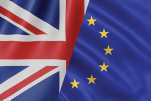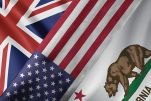This spring marks 75 years since the end of battles in Europe in World War II. Since 1945, transatlantic cooperation has been all important for the nation’s peace, democracy, shared values of freedom and the rule of law.
The United States maintains a deep trade and investment relationship with the United Kingdom, which officially left the European Union on January 31, 2020. Now that the two countries are able to enter into a formal free trade agreement (FTA), negotiations are underway and a second round is scheduled to begin the middle of June.
The California Chamber of Commerce believes strengthening economic ties and enhancing regulatory cooperation through agreements with our top trading partners that encompass both goods and services, including financial services, is essential to eliminating unnecessary regulatory divergences that may act as a drag on economic growth and job creation.
This is the first FTA ever to be negotiated virtually. During the first round in May, approximately 100 negotiators on each side covered multiple topics in approximately 25 different chapters. A second virtual round will take place the weeks of June 15 and 26, with further rounds expected to follow.
Preparing for FTA Activity
In July 2017, U.S. Trade Representative Robert Lighthizer and U.K. Secretary of State for International Trade Dr. Liam Fox formed the U.S.-UK Trade and Investment Working Group, which focused on providing commercial continuity for U.S. and UK businesses, workers, and consumers as the U.K. left the European Union. The working group laid the groundwork for the FTA negotiations as it explored ways the two countries can collaborate to promote open markets, and freer and fairer trade around the world.
The working group has met six times going into 2020 and created the U.S.-U.K. Small and Medium-Sized Enterprises (SME) Dialogue, which met several times.
In October 2018, the U.S. Trade Representative notified Congress of the Trump administration’s intent to enter into trade negotiations with three markets: the European Union, the United Kingdom, and Japan. In February 2019, the U.S. Trade Representative released a list of specific negotiating objectives.
Anticipated Action
The CalChamber is hopeful that negotiations for the U.S.-U.K. trade agreement will conclude this year. The CalChamber supports the goal of strengthening the trading and investment relationship between the two countries, with a focus on securing open market access. The CalChamber supports the following issues being discussed during negotiations:
• market access for goods;
• data protection and data transfers;
• financial services;
• intellectual property rights;
• movement of labor; and
• regulatory cooperation.
Andrew Whittaker, the British Consul General in San Francisco, comments: “the rationale for the FTA is strong. The U.S. and the U.K. are respectively the first and fifth largest economies in the world. Our bilateral trade in goods and services was $304 billion in 2019. We are already each other’s biggest investors, creating high-skilled jobs and stimulating growth in both of our economies. In California alone, over 100,000 jobs are supported by exports to the U.K. and another 112,000 Californians are employed by U.K. subsidiaries.”
He continues: “We want to enhance the mutual trading relationship in key areas such as food and drink, advanced manufacturing and services, with mutually beneficial tariff reductions, better customs arrangements and other enhancements. We want to take full advantage of the chance that an FTA provides to set new standards for digital trade and intellectual property protection. We want to future-proof the agreement to take account of changing technology and disruptive innovation, with cutting-edge provisions that maximize opportunities for digital trade economy-wide.”
Trade Impact
Two-way trade between the United States and the United Kingdom was $132.33 billion in 2019 and the U.K. was the fifth largest importer of U.S. goods with a total value of $69.15 billion.
Top exports to the U.K. were transportation equipment, making up 19%, followed by primary metal manufacturing, chemicals, and oil and gas. The U.S. imported $63.18 billion from the U.K. in 2019. Transportation equipment accounted for 26.9% of the total, followed by chemicals, nonelectrical machinery, and reimports. (U.S. Department of Commerce)
The United Kingdom is California’s 12th largest export destination, with more than $5.2 billion in exports. Computer and electronic products accounted for approximately 25% of exports—more than $1.3 billion. Transportation equipment brought in $797 million, or 15.1%; while both secondhand merchandise and chemicals accounted for 11% and 8.6%, respectively.
In 2019, imports into California from the United Kingdom were approximately $6.16 billion, with the top categories being transportation equipment, which made up almost 50% of the total, followed by computer/electronic products, used or secondhand merchandise, and reimports.
Investment Impact
The U.S. Department of Commerce describes the U.S.-U.K. investment relationship as the largest in the world, valued at more than $1 trillion in 2016 and creating over 2 million jobs, about 1 million in each country.
More than 42,000 U.S. firms export to the United Kingdom. Annual U.S. exports to the U.K. are valued at more than $100 billion.
British investment is key in the United States. More than a million Americans go to work every day for British companies. Similarly, 1 million Brits go to work for American companies every day.
U.K. foreign direct investment (FDI) in the United States contributed $7.9 billion to research and development and an additional $43.1 billion to expanding U.S. exports. The top industry sectors for British FDI in the United States are: business services, software and information technology (IT) services, financial services, communications, industrial machinery, and textiles. (Select USA)
In California, the No. 2 country for FDI through foreign-owned enterprises (FOEs) is the United Kingdom. British FOEs in California provide more than 111,430 jobs through 2,433 firms amounting to $9.44 billion in wages. The top jobs by sector are: professional/business services, manufacturing, wholesale trade, transportation/warehousing/utilities, and retail trade (World Trade Center Los Angeles, FDI Report, May 2020).
CalChamber Position
The CalChamber, in keeping with long-standing policy, enthusiastically supports free trade worldwide, expansion of international trade and investment, fair and equitable market access for California products abroad and elimination of disincentives that impede the international competitiveness of California business.
Agreements like this have the capability of ensuring that the United States may continue to gain access to world markets, which will result in an improved economy and additional employment of Americans.
European Union-United Kingdom FTA
 At the same time, the U.K. is in talks over its future trade partnership with the European Union. There are ongoing rounds of negotiations and only six months left before the deadline for concluding an FTA at the end of the year.
At the same time, the U.K. is in talks over its future trade partnership with the European Union. There are ongoing rounds of negotiations and only six months left before the deadline for concluding an FTA at the end of the year.
Negotiators failed to find much common ground during the third round in May. The fourth round, which concluded the first week of June, left the EU and Britain far apart on issues including fair competition, governance and fishing rights. Negotiations will resume in late June or early July.
If the negotiation period is not extended this month, a deal needs to be completed by the end of October to allow time for ratification by the 27 members of the European Union.
If no agreement is reached, the U.K. would leave the European Union at the end of 2020 and operate under the terms of the World Trade Organization.
Although the U.K. officially left the 27-nation bloc on January 31, it remains within the EU’s economic and regulatory rules until the end of the year and must now develop a new relationship covering trade, security, etc.
It may be difficult to conclude a U.S.-U.K. FTA until the U.K.-EU agreement is concluded. At the same time, the U.S.-U.K. FTA can set the standard for future U.K. FTAs, which now must be established following the United Kingdom’s departure from the European Union.


